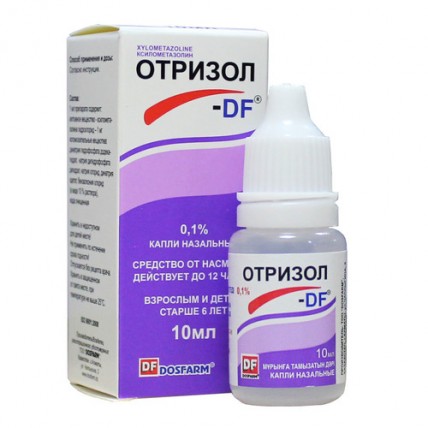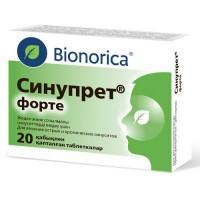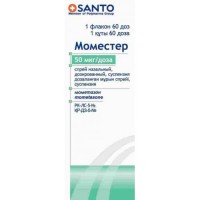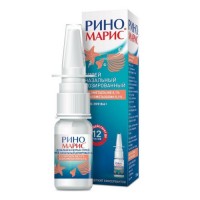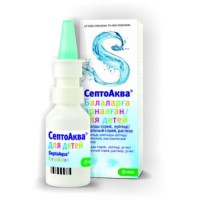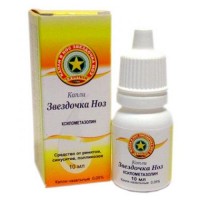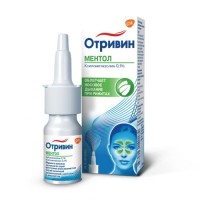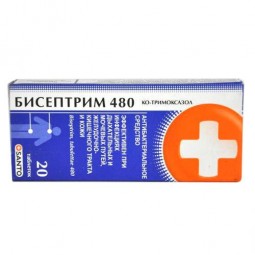Otrizol-DF 0,1% 10ml nasal drops
- $2.80
The trade name
of Otrizol-DF
the International unlicensed
name Xylomethazolinum Dosage Form
of the Drop nasal 0.05%, 0.1% 10 ml
Structure
of 1 ml of drug contains
active agent - xylomethazolinum a hydrochloride of 0.5 mg or 1 mg, excipients: phosphate dinatrium dodecahydrate, dihydrophosphate sodium a dihydrate, sodium chloride, dinatrium edetat, a benzalkoniya chloride (in the form of 10% of solution), the water purified.
Description
Transparent colourless or slightly yellowish liquid
Pharmacotherapeutic group
Nasal drugs. Antikongestanta and other nasal drugs for topical administration. Sympathomimetics. Xylomethazolinum
the ATX R01AA07 Code
the Pharmacological
Pharmacokinetics At properties topical administration in the recommended doses drug is practically not absorbed, concentration in plasma are so small that they cannot be determined by modern analytical methods.
A pharmacodynamics
Alpha adrenomimetik from group of derivatives of imidazoline. In low concentration works on α2-адренорецепторы, in high concentrations has effect on α1-адренорецепторы. At topical administration causes narrowing of blood vessels of a mucous membrane of a nose, reduces a blood stream in venous sine, eliminating, thus, hypostasis and hyperaemia of a mucous membrane of a nose, reduces amount of the separated secretion, restores passability of the nasal courses, facilitates nasal breath.
In therapeutic concentration does not irritate mucous, does not cause hyperaemia. Action comes in 5 - 10 minutes, and remains for 6-8 hours, the spasm of blood vessels remains till 8-12 o'clock.
Indications
- acute respiratory diseases with the phenomena of rhinitis (cold)
- vasomotorial rhinitis
- acute allergic rhinitis (hay fever, a pollinosis)
- sinusitis
- average otitis (as a part of combination therapy — for reduction of hypostasis of a mucous nasopharynx)
- training of the patient for diagnostic procedures in the nasal courses
the Route of administration and
Intranazalno's doses.
0.05% of a drop from 2 to 6 years, nasal for children: on 1 drop in each nasal course of 1 - 2 time a day.
0.1% of a drop nasal for adults and children are more senior than 6 years: on 1-2 drops in each nasal course of 1 - 2 time a day.
It is not necessary to apply more than 3 times a day.
Course of treatment no more than 5 - 7 days.
Side effects
often:
- at frequent or prolonged use the irritation or dryness mucous a nose, an artrofiya mucous a nose, burning, sneezing, dependence, hypersecretion, chronic rhinitis
infrequently is possible:
- heartbeat, disturbance of a warm rhythm, increase in arterial
blood pressure
- nausea, vomiting
- allergic reaction (Quincke's edema, urticaria, an itching)
- a depression (at prolonged use of high doses)
- a disorder of vision
is very rare:
- excitement
- a headache
- fatigue, drowsiness, block
- insomnia
- hallucinations and spasms (especially at children)
Contraindications
- hypersensitivity to drug components
- atrophic rhinitis
- closed-angle glaucoma
- surgical interventions on a meninx (in the anamnesis)
- a hyperthyroidism
- diabetes
- the profound atherosclerosis
- an arterial hypertension
- tachycardia
- a serious illness of eyes
- a pheochromocytoma
- a porphyria
- a prostate hyperplasia
- a concomitant use of inhibitors of a monoaminooxidase and the period up to 14 days after the end of their use
- children's age up to 2 years (for Otrizola-DF of 0.05%)
- children's age up to 6 years (for Otrizola-DF of 0.1%)
Medicinal interaction
Combined use with inhibitors of a monoaminooxidase (MAO) and within 14 days after its cancellation and also with tricyclic antidepressants can lead to increase in arterial blood pressure.
Special instructions
it is not necessary to exceed independently recommended doses and to use drug more than 5 - 7 days.
To apply with care in the coronary heart disease (CHD).
Children's age
Use for children only according to the recommendation of the doctor.
Pregnancy and the period of a lactation
is not recommended in connection with insufficient experience of use. Use of drug at pregnancy and in the period of a lactation perhaps only when the expected advantage for mother exceeds potential risk for the child and a fruit.
Features of influence of drug on ability to run the vehicle or potentially dangerous mechanisms
Drug in the recommended doses does not affect ability to run motor transport or potentially dangerous mechanisms
Overdose
Symptoms: feeling of alarm, excitement, hallucinations and spasms, a hypothermia, a lethargy, drowsiness, a coma, a miosis, a mydriasis, the increased sweating, fever, pallor of integuments, cyanosis, nausea and vomiting, tachycardia, bradycardia, cardiac arrhythmia, cardiac arrest, palpitation, hypertensia, shocklike hypotonia, a fluid lungs, respiratory depression and an apnoea, mental disorders. At children after overdose the symptoms from central nervous system including spasms, a coma, bradycardia, an apnoea and hypertensia which can pass into hypotonia develop generally.
The clinical picture of intoxication can be greased since phases of stimulation of central nervous system alternate with phases of oppression of central nervous system.
Treatment: immediately appoint activated carbon (absorbent), sodium sulfate (depletive) or gastric lavage. In a lowering of arterial pressure appoint non-selective alpha blockers. Use of vazopressor is contraindicated. If necessary carry out febrifugal, anticonvulsant therapy and artificial ventilation of the lungs.
A form of release and packing
On 10 ml of drug in the plastic bottles droppers corked by caps with control of the first opening. On each bottle paste labels. On one bottle together with the instruction for medical use in the state and Russian languages place in a pack cardboard.
To Store storage conditions in the place protected from light, at a temperature not above 25 °C.
To store out of children's reach!
3 years
not to apply a period of storage after an expiration date.
Prescription status
Without prescription
DOSFARM LLP Producer, Kazakhstan, 050034, Almaty, Chaplygin St., 3, ph.: (727) 253-03-88
of Otrizol-DF
the International unlicensed
name Xylomethazolinum Dosage Form
of the Drop nasal 0.05%, 0.1% 10 ml
Structure
of 1 ml of drug contains
active agent - xylomethazolinum a hydrochloride of 0.5 mg or 1 mg, excipients: phosphate dinatrium dodecahydrate, dihydrophosphate sodium a dihydrate, sodium chloride, dinatrium edetat, a benzalkoniya chloride (in the form of 10% of solution), the water purified.
Description
Transparent colourless or slightly yellowish liquid
Pharmacotherapeutic group
Nasal drugs. Antikongestanta and other nasal drugs for topical administration. Sympathomimetics. Xylomethazolinum
the ATX R01AA07 Code
the Pharmacological
Pharmacokinetics At properties topical administration in the recommended doses drug is practically not absorbed, concentration in plasma are so small that they cannot be determined by modern analytical methods.
A pharmacodynamics
Alpha adrenomimetik from group of derivatives of imidazoline. In low concentration works on α2-адренорецепторы, in high concentrations has effect on α1-адренорецепторы. At topical administration causes narrowing of blood vessels of a mucous membrane of a nose, reduces a blood stream in venous sine, eliminating, thus, hypostasis and hyperaemia of a mucous membrane of a nose, reduces amount of the separated secretion, restores passability of the nasal courses, facilitates nasal breath.
In therapeutic concentration does not irritate mucous, does not cause hyperaemia. Action comes in 5 - 10 minutes, and remains for 6-8 hours, the spasm of blood vessels remains till 8-12 o'clock.
Indications
- acute respiratory diseases with the phenomena of rhinitis (cold)
- vasomotorial rhinitis
- acute allergic rhinitis (hay fever, a pollinosis)
- sinusitis
- average otitis (as a part of combination therapy — for reduction of hypostasis of a mucous nasopharynx)
- training of the patient for diagnostic procedures in the nasal courses
the Route of administration and
Intranazalno's doses.
0.05% of a drop from 2 to 6 years, nasal for children: on 1 drop in each nasal course of 1 - 2 time a day.
0.1% of a drop nasal for adults and children are more senior than 6 years: on 1-2 drops in each nasal course of 1 - 2 time a day.
It is not necessary to apply more than 3 times a day.
Course of treatment no more than 5 - 7 days.
Side effects
often:
- at frequent or prolonged use the irritation or dryness mucous a nose, an artrofiya mucous a nose, burning, sneezing, dependence, hypersecretion, chronic rhinitis
infrequently is possible:
- heartbeat, disturbance of a warm rhythm, increase in arterial
blood pressure
- nausea, vomiting
- allergic reaction (Quincke's edema, urticaria, an itching)
- a depression (at prolonged use of high doses)
- a disorder of vision
is very rare:
- excitement
- a headache
- fatigue, drowsiness, block
- insomnia
- hallucinations and spasms (especially at children)
Contraindications
- hypersensitivity to drug components
- atrophic rhinitis
- closed-angle glaucoma
- surgical interventions on a meninx (in the anamnesis)
- a hyperthyroidism
- diabetes
- the profound atherosclerosis
- an arterial hypertension
- tachycardia
- a serious illness of eyes
- a pheochromocytoma
- a porphyria
- a prostate hyperplasia
- a concomitant use of inhibitors of a monoaminooxidase and the period up to 14 days after the end of their use
- children's age up to 2 years (for Otrizola-DF of 0.05%)
- children's age up to 6 years (for Otrizola-DF of 0.1%)
Medicinal interaction
Combined use with inhibitors of a monoaminooxidase (MAO) and within 14 days after its cancellation and also with tricyclic antidepressants can lead to increase in arterial blood pressure.
Special instructions
it is not necessary to exceed independently recommended doses and to use drug more than 5 - 7 days.
To apply with care in the coronary heart disease (CHD).
Children's age
Use for children only according to the recommendation of the doctor.
Pregnancy and the period of a lactation
is not recommended in connection with insufficient experience of use. Use of drug at pregnancy and in the period of a lactation perhaps only when the expected advantage for mother exceeds potential risk for the child and a fruit.
Features of influence of drug on ability to run the vehicle or potentially dangerous mechanisms
Drug in the recommended doses does not affect ability to run motor transport or potentially dangerous mechanisms
Overdose
Symptoms: feeling of alarm, excitement, hallucinations and spasms, a hypothermia, a lethargy, drowsiness, a coma, a miosis, a mydriasis, the increased sweating, fever, pallor of integuments, cyanosis, nausea and vomiting, tachycardia, bradycardia, cardiac arrhythmia, cardiac arrest, palpitation, hypertensia, shocklike hypotonia, a fluid lungs, respiratory depression and an apnoea, mental disorders. At children after overdose the symptoms from central nervous system including spasms, a coma, bradycardia, an apnoea and hypertensia which can pass into hypotonia develop generally.
The clinical picture of intoxication can be greased since phases of stimulation of central nervous system alternate with phases of oppression of central nervous system.
Treatment: immediately appoint activated carbon (absorbent), sodium sulfate (depletive) or gastric lavage. In a lowering of arterial pressure appoint non-selective alpha blockers. Use of vazopressor is contraindicated. If necessary carry out febrifugal, anticonvulsant therapy and artificial ventilation of the lungs.
A form of release and packing
On 10 ml of drug in the plastic bottles droppers corked by caps with control of the first opening. On each bottle paste labels. On one bottle together with the instruction for medical use in the state and Russian languages place in a pack cardboard.
To Store storage conditions in the place protected from light, at a temperature not above 25 °C.
To store out of children's reach!
3 years
not to apply a period of storage after an expiration date.
Prescription status
Without prescription
DOSFARM LLP Producer, Kazakhstan, 050034, Almaty, Chaplygin St., 3, ph.: (727) 253-03-88
